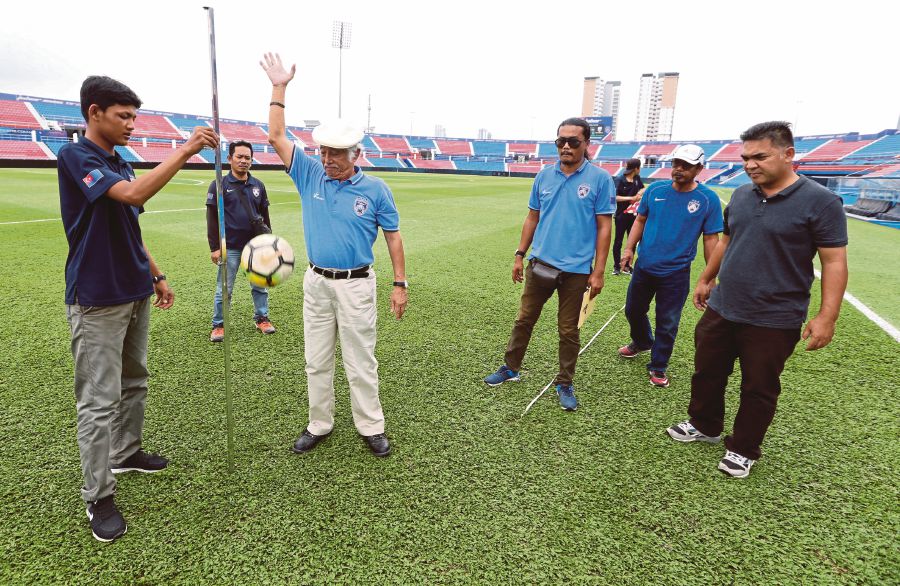
JDT head groundskeeper Hiroi Koichi (third from left) conducting several tests on the field at Larkin Stadium. -NSTP/Mohd Azren Jamaludin
WHEN Japanese Hiroi Koichi first came to Johor Darul Ta’zim’s (JDT) homeground in 2013, things were far from perfect.
The head groundskeeper of JDT was then tasked with transforming the playing field at the Tan Sri Hassan Yunos Stadium in Larkin.
The outdated drainage system and poor soil condition at the stadium were some of the problems that Koichi had to overcome.
He recalled: “It’s an old stadium, so the drainage system was outdated. We had to take various measures to ensure that water can flow properly to prevent the field from being water-logged.
“As for the soil condition, as in most areas in Malaysia, it’s red clay, which is not suitable for grass to grow properly.
“We had to remove the top part of the field and replace it with better soil so that the grass can grow healthily.”
Koichi said it took about a year for him and his team to complete the “transformation.”
He credited JDT owner, Tunku Mah kota Johor Tunku Ismail Sultan Ibrahim for making the Southern Tigers’ home venue, among the top two in Malaysia, the other being the Likas Stadium in Kota Kinabalu.
Perhaps, the grass could hear. That’s why it grows so well at the Tan Sri Hassan Yunos Stadium. At least, this was part of the story when Koichi was asked why many fans in Malaysian football were impressed by JDT’s playing pitch.
“Tunku Ismail is so passionate about maintaining the quality of the field. I often tell him that the grass could feel his passion, which is why it grows so well,” said Koichi.
“If Tunku Ismail is not so demanding on maintaining a good quality field, maybe we would not be able to achieve this recognition.”
The 75-year-old Koichi feels that if not for Tunku Ismail’s insistence for a high standard playing pitch, JDT would not have such a field that fans talk about.
Koichi, who first came to Johor 27 years ago, said: “I consider myself as a half-Johorean, after being here for so long.
“I am very happy to hear that people like to play football at the stadium,” he added.
Koichi, who is originally from Niigata, Japan, currently heads a team of 30 staff maintaining 10 fields for JDT, including the club’s training ground.
He is also responsible for the design and maintenance of the playing field at the Sultan Ibrahim Stadium, JDT’s new stadium which is expected to be ready by the end of the year.
“We would conduct three tests on the field before every game, which is checking the height of the grass, the ball roll and bounce test at six parts of the field.
“A good quality playing field is not only important for players to play well and show their skill but also in preventing injuries, which is a fear for all players and coaches.”
Ulasan
Catat Ulasan